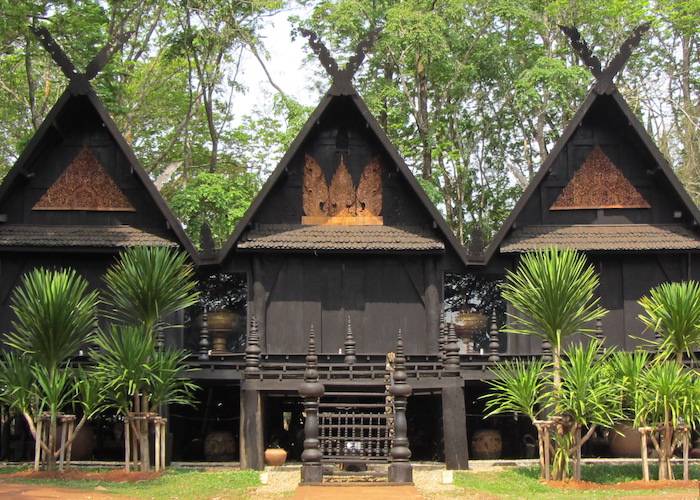The Baandam Museum, informally known as the Black House Chiang Rai is located just outside the city. It is one of the most popular Chiang Rai temples to visit, but is actually more of a museum than a temple, though it does contain some shrines.
Entrance to the Black House Chiang Rai was just 80 Baht – well worth the money for what you see.
How to get to the Black House Chiang Rai – Baandam Museum
It’s a good idea to combine this as a day trip to Wat Rong Khun (The White Temple) and Wat Rong Suea Ten (The Blue Temple). A taxi should be able to do this round trip and wait for you for around 700 Baht.
I would recommend that you spend at least two hours at the Baandam Museum as there is so much to see. It’s more than one building – actually, it’s a complex of around 40 buildings by that combine architectural mastery with elaborate wood carvings.
Discovering the Black House Chiang Rai
The buildings and it’s contents are a masterpiece and collection by Thai painter and architect Thawan Duchanee (September 27, 1939 – September 3, 2014) In 2001, he was given the price by the Office of the National Culture Commission of Thailand as the National Thai Artist in Fine art and Visual art. Following construction of the Black House (Baandam Museum), it was his residence for the rest of his life.
Elaborate Wood Carving of the Baandam Museum
Inside the Black House – The Weird and Wonderful Collection of Thawan Duchanee
Inside the Black House buildings you will find a vast array of works of art, carvings and animal skins. Many of these are expressions of Thai culture and religion.
This wooden Ganesh is mainly a Hindu God of wisdom, but is widely recognised in Buddhism also.
The collection of animal skins is extensive – you will find several preserved crocodile skins, skulls with horns and even a full elephant skeleton. The animals all died of natural causes (there was no harm to elephants or crocodiles during the making of this museum!)
Somewhat explicit and intriguing was the collection of ‘penis’ bowls and paraphernalia. The penis is a symbol of fertility in Thai culture.
White Igloos
Walk to the far end of the complex and you will come across some white igloo shaped buildings housing Duchanee’s most bizarre.
In one of them, I was greeted by a black obsidian statue of a male with a rather large member! Inside the igloo were shells arranged in a circular fashion to reflect the building walls, and several animal horn chairs.
I found several elephant statues around the igloos and far buildings, which I love.
If you enjoyed my article on the Black House Chiang Rai and are spending time in the city, I also recommend that you visit the White Temple, the Blue Temple and the Crouching Elephant temple.
Visiting the Black House Chiang Rai?
Where to stay in Chiang Rai – Connect Hostel
Where to eat in Chiang Rai – Barrab, Sawaddee, Smiling Moon Cafe.
What to wear when Visiting Temples in Thailand
What should you wear when visiting temples in Thailand? Dress conservatively when visiting temples in Thailand. Wear trousers or a long skirt and cover shoulders.
A scarf is a good thing to have handy in Thailand as you can use it to cover yourself if you are wearing a vest top or maxi dress. Men should avoid shorts and wear t-shirts or a smart-casual shirt.
You will need to remove your shoes before going up the temple steps so wear some comfortable sandals or shoes that you can slip on and off. Birkenstocks are a good option.


